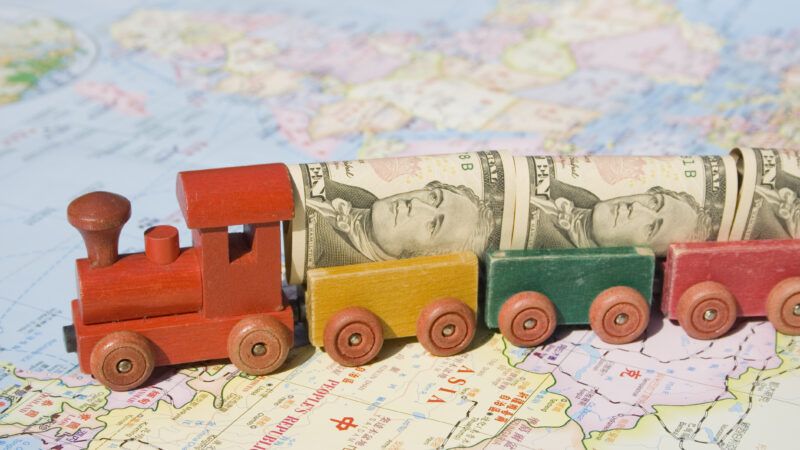Survey: 63 Percent of Americans Support Free Trade. Why Don't Our Politicians?
Seventy-five percent of respondents are concerned that tariffs will raise the cost of the things they buy, yet neither Trump nor Harris has suggested lowering them.

A recent survey found that, by and large, people support free trade. So why don't our politicians?
This week, the Cato Institute released its 2024 Trade and Globalization National Survey. Of the 2,000 American adults polled by YouGov, 66 percent said that international trade is good for the U.S. economy. When half of the respondents were asked if they "favor or oppose the United States increasing trade with other nations," 63 percent were in favor. (The other half were instead asked if they "favor or oppose people in the United States trading more with people from other nations," to which a smaller majority of 53 percent responded favorably.)
And why shouldn't they? Free trade among nations has numerous positive effects: It lowers consumer prices, decreases inflationary pressures, and incentivizes efficiency and innovation. In 1817, the British economist David Ricardo determined that "a country should produce and export only those goods and services which it can produce more efficiently than other goods and services, which it should import," as summarized by Marian Tupy in 2017.
That sentiment doesn't seem to have caught on among our national politicians. Both President Joe Biden and former President Donald Trump have instituted tariffs on imported goods. In Trump's case, the tariffs—intended to target China—actually stymied U.S. exports and drove more automaker jobs overseas. Then once Biden took office, he neglected to repeal—and in some cases even raised—the tariffs Trump had imposed, which Trump called out at their debate in June.
If elected again in November, Trump has floated a 10 percent tariff on nearly all imported goods and a 60 percent tariff on goods from China. Vice President Kamala Harris, who recently replaced Biden as the presumptive Democratic nominee, has not addressed trade policy on the campaign trail, but she's unlikely to depart significantly from her boss: William Reinsch of the Center for Strategic and International Studies told The New York Times that Harris is "a bit of a blank slate, but one most likely to be filled in with trade skepticism." Based on her time in the U.S. Senate, Reinsch assumes that "she is part of the progressive wing of the party which is skeptical of trade agreements in general, and particularly of those that involve market access."
It's a shame that neither of the candidates representing the two major political parties favors free trade in an open market—especially since the Cato poll suggests that Americans, in large part, do.
Unfortunately, the poll also suggests that Americans—just like their elected officials—may be a bit confused on the subject.
Seventy-five percent of respondents indicated being "very concerned" or "somewhat concerned" "about rising prices of things you buy because of trade tariffs." But a majority would also support imposing tariffs on certain products, under certain conditions, if they felt it would help American businesses. For example, 62 percent said they would support "adding a tariff to blue jeans sold in the US that are manufactured in other countries to boost production and jobs in the American blue jean industry"—though, notably, 66 percent would oppose a tariff if it raised the price of a pair of jeans by $10.
Further, when asked, "From what you've read and heard, who primarily is responsible for paying for the cost of a U.S. tariff," only 47 percent answered that it was American consumers. The next highest answer was "Not sure" at 20 percent, followed by 15 percent who said the U.S. government pays, 12 percent who said foreign companies pay, and 5 percent who said foreign governments pay the tariffs.
Despite Trump's claims that exporting countries pay tariffs, it is indeed consumers who pay in the form of higher prices. On the campaign trail in 2019, Biden claimed—accurately—that "Trump doesn't get the basics. He thinks his tariffs are being paid by China. Any freshman econ student could tell you that the American people are paying his tariffs." And yet as recently as last month, Biden was proposing 25 percent tariffs on imports from Mexico that use Chinese steel.
While not entirely consistent on the subject, the survey suggests that Americans largely recognize the positive effects of international free trade. It's a shame, then, that our politicians don't.


Show Comments (53)